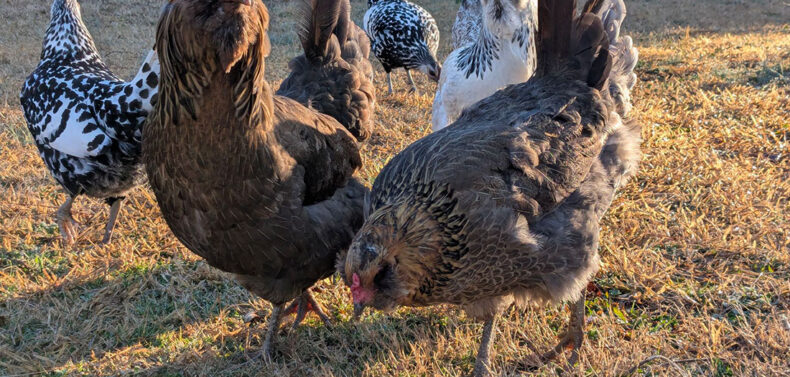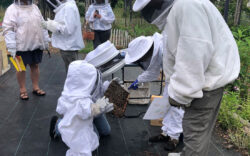Egg prices are rising again—$4.67 a dozen at my favorite Athens discount grocery store. Have those prices sent you dreaming of your own feathered flock churning out backyard eggs for free?
I believe more people should have backyard flocks. Unfortunately, owning chickens isn’t as simple as step 1: buy chicks; step 2: eat eggs. Here are a few things to consider before bringing home a basket of biddies.
Athens-Clarke County regulations allow up to six hens in a fenced, enclosed space in the backyard. You’ll want to allow about 5 square feet per bird, according to The Backyard Chicken Bible. You can get away with less space, but crowded chickens will fight. Less space also means more opportunities for illness to spread quickly.
Pre-built coops are handy but expensive. Downloadable DIY coop blueprints cost less, and can still cost a few hundred dollars in supplies. It can be tempting to envision a tiny chicken-themed gingerbread house for your girls to enjoy, but remember: They will poop all over it. For chicken houses, it’s best to stick to practical structures.
If you plan to wing it when it comes to your coop, consider possible predators in your area. The fencing on a repurposed dog kennel will not stop raccoons from killing unprotected hens at night. Rats and snakes both are good at sneaking into coops to eat eggs. If you’re the design-as-you-go type, be prepared for some trouble shooting.
Some chickens are bred as meat birds, others as egg layers and some are dual purpose. Some chicken breeds sport stylish feathers, and others handle extreme cold or terrible heat well. One of my favorites, Blackie (a mix between an Ameraucana and a Silver Hamburg), lays big baby blue eggs. She doesn’t lay as many eggs as Raggedy Anne (an Olive Egger), who lays about five eggs a week. Both of these hens struggle when the temperature rises above 90 degrees, and stop laying completely when they’re too hot. Miss Fayoumi (an Egyption Fayoumi), unbothered by Georgia summers, steadily lays three to four little white eggs a week through July and August. I like the genetic diversity of my hen house and that it helps keep eggs on the menu.
Athens-Clarke County regulations do not allow roosters. If you buy sex-linked chicks (reputable breeders can tell the gender of a sex-linked chick based on its coloring) you’ll have all hens. If you’re purchasing any non-sex-linked chickens, there’s a chance you’ll wind up with a rooster. It’s best to have a plan in place, just in case you wind up with a he instead of a she.
Some Internet “experts” will say chickens can be fed from a family of four’s table scraps. If anyone has enough food waste to feed backyard birds, here’s a way to trim the grocery bill: Eat the food instead of throwing it out. I do know some farmers who feed their flocks primarily on scraps, but that food waste comes from one or more restaurants, not a single family. Still, those farmers have to make sure to add calcium (without which the eggs will be soft) and protein (because large eggs contain 6 grams of protein, and that’s got to come from somewhere) to keep their flocks healthy. Depending on the breed, you’ll need at least three to four months of food before your hens mature and begin producing eggs. Sacks of chicken food cost about $16–$20 for a 40–50 pound bag.
Hens lay eggs from their cloaca; the same exit is used for feces. Changing the bedding regularly will help keep poop off your eggs, but won’t stop it completely. If your family only wants the biggest, cleanest, brightest white eggs, you might want to stick with the $5-a-dozen option from the grocery store.
Avian influenza is one of the reasons for egg prices rising. If you keep backyard chickens, you have a duty to protect them from infections and stop the spread of disease. The Georgia Department of Agriculture recommends calling the avian flu hotline at (770) 766-6850 if you have questions. Free testing also is available through the Georgia Poultry Lab.
Like what you just read? Support Flagpole by making a donation today. Every dollar you give helps fund our ongoing mission to provide Athens with quality, independent journalism.










